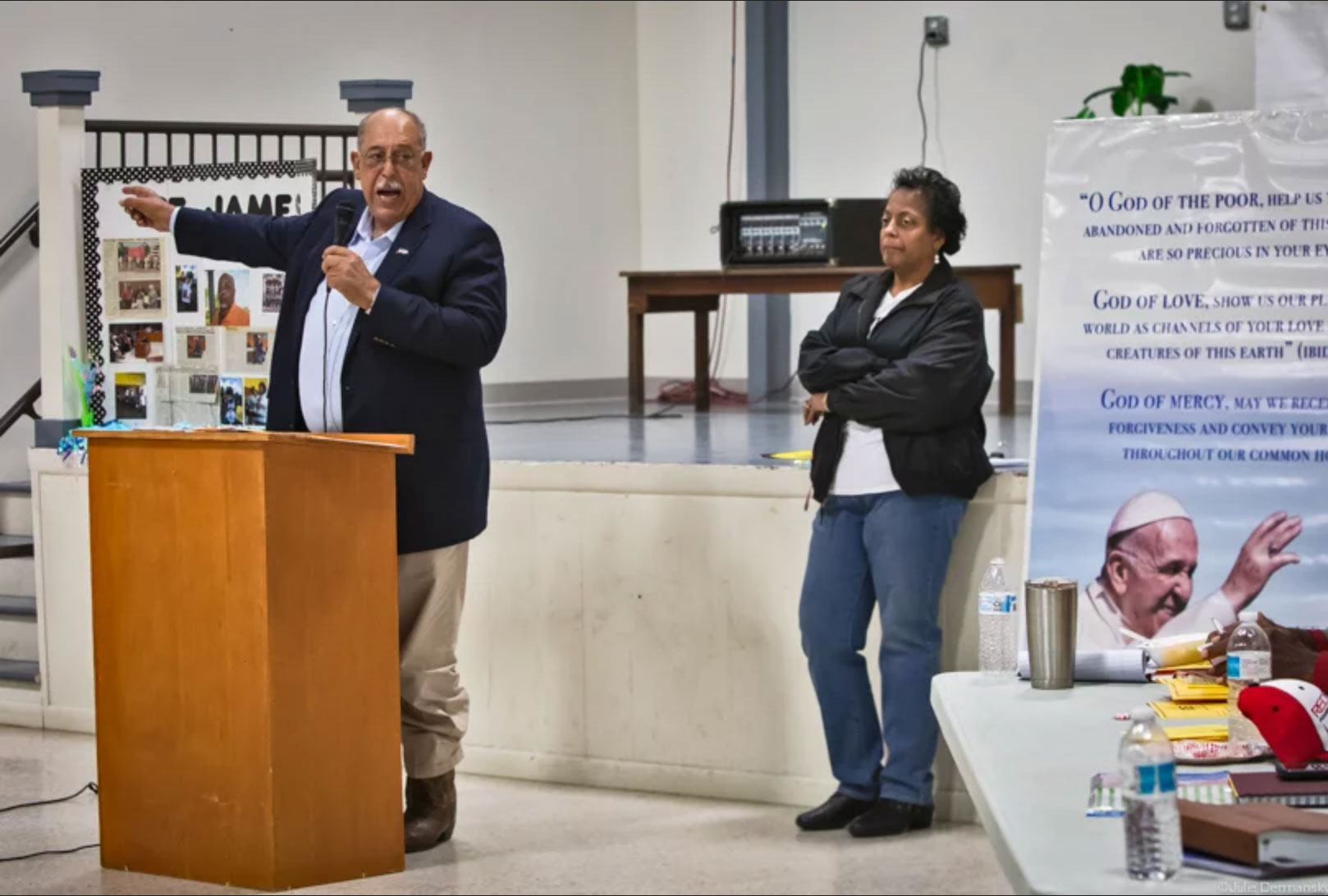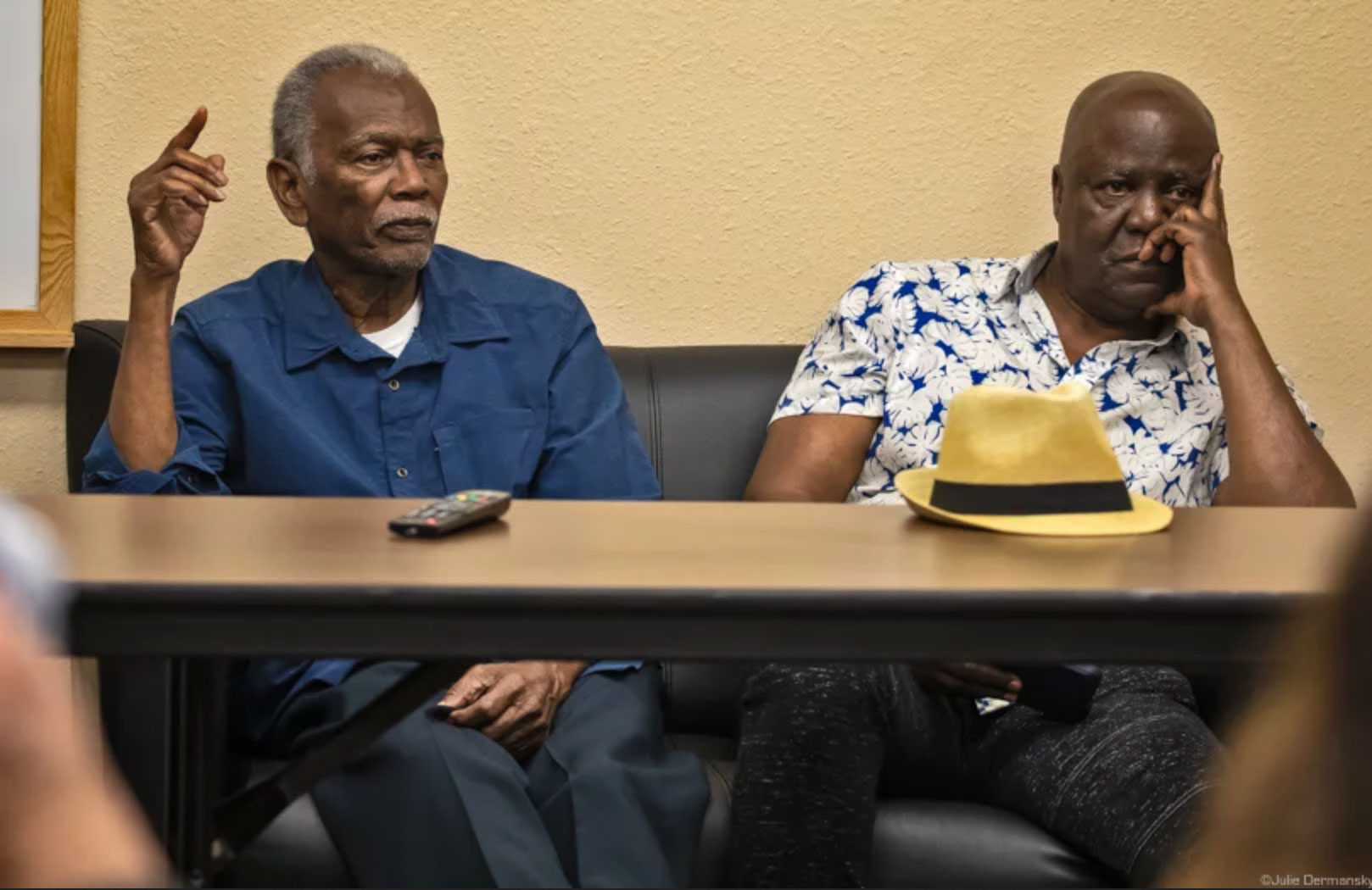
Truthout is an indispensable resource for activists, movement leaders and workers everywhere. Please make this work possible with a quick donation.
“Take a deep breath” is common advice for helping people to relax. However, that advice has the opposite effect on some citizens who live in heavily polluted Louisiana communities along the Mississippi River. There, a new coalition is emerging from a growing awareness of — and discontent with — the potential health impacts of living alongside the expanding petrochemical industry lining the river between Baton Rouge and New Orleans.
The 80-mile stretch along the river known as Louisiana’s “Petrochemical Corridor” is often referred to as “Cancer Alley.” Simmering frustrations among its communities, which are exposed to the industry’s pollution, recently led the new coalition of environmental and civil rights activists and Louisiana residents to rebrand it “Death Alley.”
“The government is not doing its job to protect us,” Robert Taylor, a resident of St. John the Baptist Parish, and part of the group, Coalition Against Death Alley (CADA), told me. “By not acting they are signing our death warrants.”
The coalition formed early this year as the number of companies seeking approval to build fossil fuel-hungry plastics manufacturing facilities along the Mississippi River has grown. The U.S. Environmental Protection Agency (EPA) already has identified the sites as hot spots for toxic chemical releases in its latest National Air Toxics Assessment. Those hot spots include parts of St. James Parish and St. John the Baptist Parish.
To call attention to the area’s environmental injustices, CADA announced ambitious plans to march about 50 miles from St. John the Baptist Parish to Baton Rouge, stopping in communities impacted by fossil fuel industry pollution along the way. Louisiana-based residents and groups that make up the coalition include members of RISE St. James, Justice and Beyond, the Louisiana Bucket Brigade, 350 New Orleans, and the Concerned Citizens of St. John, among others.
St. John the Baptist Parish: Where the Air Increases Cancer Risk
Taylor asks: “How can you relax when you know you are breathing in carcinogens?” As the founder of the Concerned Citizens of St. John, he is taking a leading role in the new coalition. He started the concerned citizens group in 2016, after his community learned that the EPA reclassified chloroprene, a chemical released in his area for more than 40 years, as a likely human carcinogen.
In St. John the Baptist Parish, a Denka plant releases chloroprene and other chemicals as it makes the synthetic rubber commonly known as Neoprene. Taylor is outraged by what he characterizes as the state and federal governments’ lack of action to protect his community.
According to a 2015 EPA assessment, residents near Denka’s plant, including Taylor and his family, have a lifetime cancer risk from air pollution 800 times higher than the national average, and the populations in six parish census tracts closest to the Denka facility have the highest risk of air pollution-caused cancer in the country.
Though Denka reduced chloroprene emissions 85 percent in the last year, levels remain considerably higher than 0.2 micrograms per cubic meter, the EPA standard deemed acceptable to protect human health. Ongoing air monitoring near the plant shows emissions remain consistently greater than this level.
Denka does not agree with the EPA’s findings and continues to challenge them. Chuck Carr Brown, head of the Louisiana Department of Environmental Quality, has taken a “wait and see” stance when it comes to requiring more from Denka to limit emissions. Brown and Jimmy Guidry, the state health department officer, have a contentious relationship with the citizens group in St. John the Baptist Parish and have butted heads over the EPA’s recommended standard and government actions.
The group’s outrage grew on February 19 after David Gray, a regional EPA official, told them that the EPA will likely never set a legal standard for chloroprene emissions. Though the agency stands by its earlier findings for now, Gray explained that, because only one plant in the United States emits chloroprene, the agency is unlikely to embark on the laborious five-year process to create a rule. In the past, the agency has only set rules for chemicals used by multiple plants.
Many at the meeting audibly gasped. “We are being poisoned,” Taylor said, then asked why the government isn’t protecting the parish’s 400 black children from Denka’s “monstrous plant.”
Gray expressed empathy for the community. He assured the group that the EPA will continue working to bring down chloroprene levels, and, though he too is frustrated that his agency can’t do more for the community faster, the EPA has limitations.
After the meeting, Taylor doubled down his participation in the new coalition. Though the coalition’s call “to stop the genocide in Death Alley” isn’t language all of the members of the Concerned Citizens are on board with, none are satisfied with their treatment by state regulators or the governor.
Controversy Over Role of Politics in Fight Against Pollution
On March 2, RISE St. James, a faith-based community group focused on stopping industrial expansion in St. James Parish, organized a gathering of about 50 at a local church. In addition to praying and sharing a meal, they discussed the need to stop more petrochemical plants from being built in the Louisiana parishes along the Mississippi River.

Lt. General Russel Honoré, founder of the Green Army, was one of the invited speakers. He advised CADA to clarify its goals and warned he won’t stand with the coalition if it targets the current Democratic Governor John Bel Edwards, who is up for re-election. believes the only way to make changes in the state is through the legislature.

Pat Bryant, with Justice and Beyond, a New Orleans-based civil rights organization, countered Honoré. He pointed out that Edwards’ administration is responsible for not enforcing environmental regulations and permitting more polluting plants, making him part of the problem. CADA, Bryant said, will not stop its pointed criticism of the governor or other local officials until they protect the citizens they are supposed to serve.
Taylor doesn’t equate criticizing the actions of current government officials as taking a political stance. “I’m not attacking the governor,” he told me on a call, “but by not protecting us, we are under attack.” The Concerned Citizens of St. John the Baptist won’t endorse any political candidates.
Two New Chemical Plants Seek Permits to Build in St. James Parish
The new coalition’s concerns came into focus at a March 25 St. James Parish Commission meeting, where commissioners planned to vote on permitting two new petrochemical additions to the area: Syngas’s methanol facility and Chinese-owned Wanhua’s chemical plant.
Several residents who live near both the proposed sites, which are in predominantly African-American communities, accused the commission of selling them out in the past. They pleaded with the commissioners to deny both permits to keep more pollution out of their already polluted environment.
A commissioner questioned a Wanhua representative about an allegation that the company left chemicals off the parish permit which were listed on its state environmental permit application. The Wanhua representative explained that the parish application didn’t require listing those particular chemicals but that they won’t harm the community.
The response didn’t satisfy the commission, which voted unanimously to table a vote on Wanhua’s permit. The commission voted six to one to let Syngas proceed, but before voting on Wanhua, Commissioner Dean Millet said they needed answers about the potential environmental impact of the plant.
Millet then admitted to feeling guilty after recently voting in favor of a permit for a Taiwanese-owned Formosa plastic manufacturing plant in December.
Because he, like other commissioners, had made his living from the chemical industry, he confessed he knew what goes on in those plants and could not support Wanhua. He planned to vote against the permit.
Those opposing the proposed plants congratulated each other after filing out of the parish chamber. They reasoned, it isn’t every day a petrochemical plant receives this kind of government pushback in Louisiana. A fact that the Coalition Against Death Alley plans to change.
However, coalition members are already getting push back themselves. A permit for their march through St. John the Baptist Parish has yet to be approved.
In a March 27 letter, CADA legal counsel Bill Quigley advised the parish council president to approve the march, and warned that if a permit is denied, Quigley will challenge the parish in court.
Taylor expects the parish representatives to respect the group’s constitutional rights. “The march will go on, with or without the officials’ permission,” Taylor said, stressing that it is the coalition’s intention to follow the law.
CADA’s march, slated to begin April 4, is intended as a non-violent protest. The coalition’s mission is to “pressure industrial giants and governments to stop the ongoing poisoning of majority-black communities in Louisiana’s ‘Cancer Alley,’” which it calls an “ongoing silent genocide.”
A terrifying moment. We appeal for your support.
In the last weeks, we have witnessed an authoritarian assault on communities in Minnesota and across the nation.
The need for truthful, grassroots reporting is urgent at this cataclysmic historical moment. Yet, Trump-aligned billionaires and other allies have taken over many legacy media outlets — the culmination of a decades-long campaign to place control of the narrative into the hands of the political right.
We refuse to let Trump’s blatant propaganda machine go unchecked. Untethered to corporate ownership or advertisers, Truthout remains fearless in our reporting and our determination to use journalism as a tool for justice.
But we need your help just to fund our basic expenses. Over 80 percent of Truthout’s funding comes from small individual donations from our community of readers, and over a third of our total budget is supported by recurring monthly donors.
Truthout has launched a fundraiser, and we have a goal to add 182 new monthly donors in the next 24 hours. Whether you can make a small monthly donation or a larger one-time gift, Truthout only works with your support.